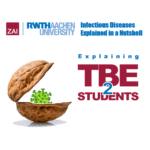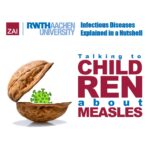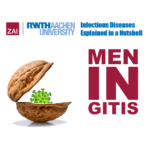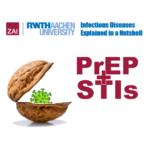Schlagwort: ‘vaccine’
Have you already had measles, the most devastating childhood disease?
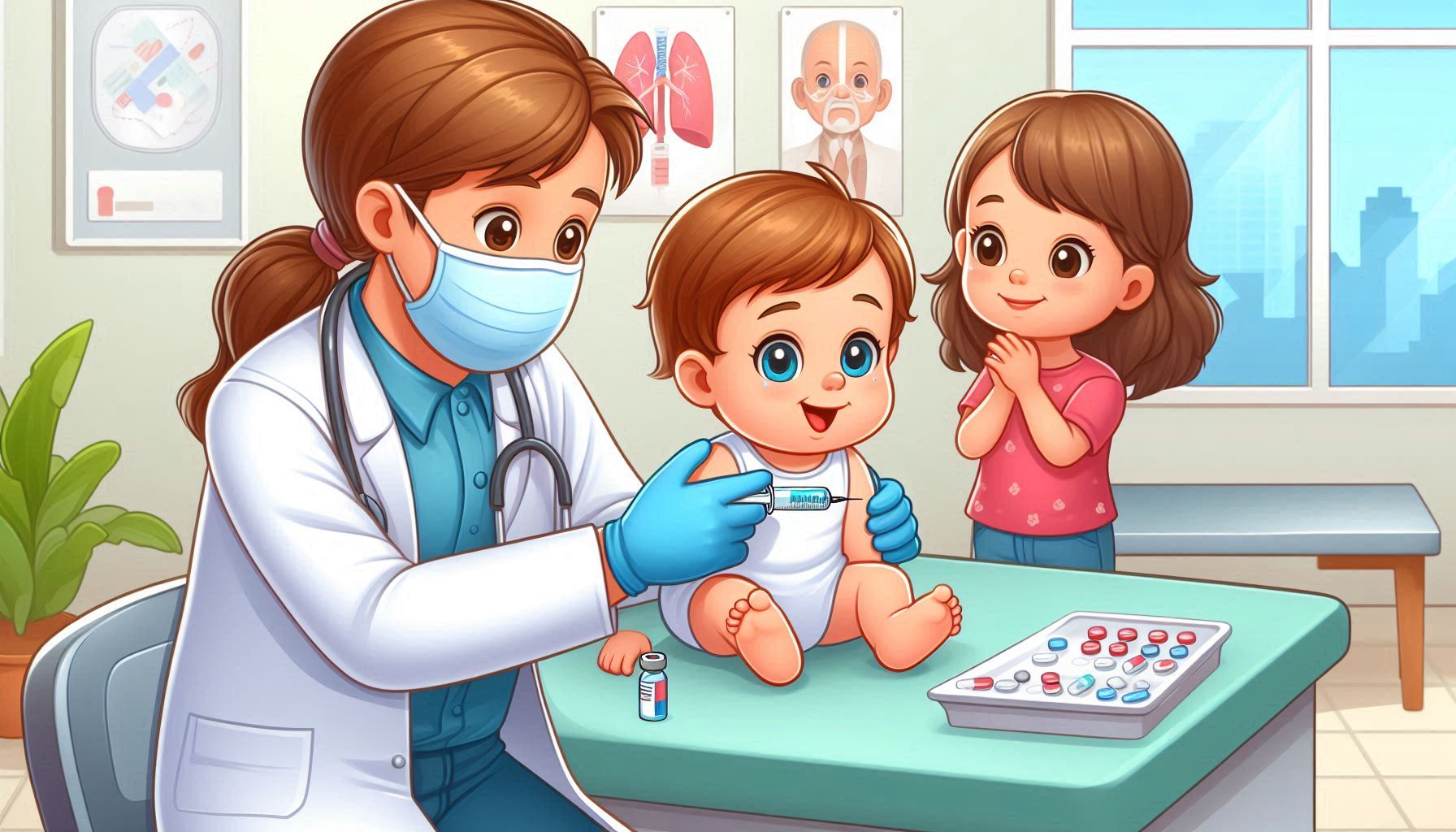
Disclaimer!
This article and its major media content are produced by students to train science communication as part of a lecture about human infectious pathogens. The article does not represent official advice from the authorities. For authorized information about the disease in question, please refer to the official health authorities in your country or the World Health Organization.
By Laura Emonds, Anna Schwartz & Franziska Steffens
Have you ever heard of the term “childhood disease”? And have you wondered why, as for the
term, only children can get sick? Why not Mom and Dad, too? We will follow Mandy*, an eightyear-
old girl, who learns about the measles disease during the current outbreaks in the USA.
Only a childhood disease?
Mandy comes home from primary school and is fed up. Instead of meeting her best friends
she must come along to her baby brother Jack’s doctor’s appointment. Her parents explain to
her that Jack will be vaccinated against measles, a childhood disease. Now Mandy is intrigued
as one of her classmates is currently sick with measles. What is a childhood disease?
Diseases are called a childhood disease when the first infection happens during the childhood.
Infected people gain lifelong immunity, which means that they won’t suffer from the same
disease again. Therefore, children get infected more often than adults. Nevertheless,
unimmunized adults can fall ill with a childhood disease, too.
And what does an infection with measles look like? Mandy watches this video that explains the
cause and symptoms of the measles disease:
Potential aftermaths of a measles infection
Those symptoms look pretty heavy, right? But most people get well after about two weeks by
treating the fever with antipyretics. Most people, but not all. A measles infection weakens your
immune system, your body’s police system against invading germs, and you can fall ill with
pneumonia or in very rare cases can suffer a meningitis. Because of these secondary
infections you can even die or suffer from lifelong consequences like paralysis.
How can you protect yourself against
measles?
Now don’t worry about getting infected with measles. These days most children are vaccinated
at age one against measles just like Mandy and her brother Jack. Maybe ask your parents if
you have been vaccinated against measles. A vaccination protects you from an infection.
There are vaccinations not just for measles but for many other diseases like e.g. chickenpox,
too. Listen to the pediatrician, who answers Mandy’s questions and explains how vaccinations
work and why they need to inject the vaccine into your arm with a syringe.
You see, a vaccination is the best way to protect you and the people around you from getting
infected as the measles disease isn’t just a harmless childhood disease. An infection can have
lethal consequences for young and adults. In some countries like eg. Germany or the USA a
vaccination against measles is compulsory for attending day care and schools as the STIKO**
stated:
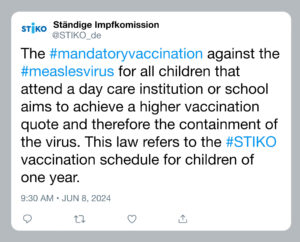
However, some people fear side effects of a vaccination or insist on their right to selfdetermination
over their own body and reject the vaccination. Nevertheless, objectively
speaking the benefits of a vaccination outweigh an unlikely risk of vaccination side effects and
prevent horrible, potential lethal courses of a measles infection.
This evening Mandy falls asleep knowing that she and her loved ones are safe just because
of one little prick.
*fictional character
**fictional social media post
About the authors:
April 25: World Malaria Day 2023
Three Is against malaria
The world malaria report 2022 of the world health organization (WHO) states that in 2021 an estimated 247 million people were infected with malaria in 84 countries around the world with a death toll of about 619 000 people. Despite huge efforts in the eradication of the disease and constant dropping numbers throughout the last decades, levels of disease burden are still high. Especially in remote and rural areas of the tropics people are at risk without having access to appropriate prevention and health care. Among the most vulnerable groups are primarily children.
Time to deliver zero malaria: invest, innovate, implement
Therefore, each year the WHO hosts the World Malaria Day on April 25. It is a political statement to persistently raise awareness and funds for treatment and prevention. Only a continuing worldwide effort can lead to the global eradication of malaria, since risk areas include the worlds poorest countries with no access to or ressources for high-tech diagnostics, powerful medical treatments and secure life styles. This year’s World Malaria Day has been themed „Time to deliver zero malaria: invest, innovate, implement“ which comprises WHO’s goal to reduce human malaria cases to zero by
- investing in and prioritizing efforts to protect hard-to-reach and marginalized populations,
- push innovation of mosquito control, diagnostics and medical treatment,
- implementing the strategies we already have at our hands.
Who’s the killer?
Now we know that malaria kills a lot of people and causes even more disease. But what kind of agent causes malaria, how does it get into your body and what does it do there to make you feel sick? Learn about the nature and the progression of the disease, in the informative and entertaining video clip by the amazing Armando Hasudungan:
With effective drugs at hands, is malaria still so dangerous?
Successful antimalarial drugs were the hope of the last century. Unfortunately, the malaria parasite reliably develops resistance to standard drugs. This puts researchers and health officials in a constant battle to find novel drug targets within the cellular structures and the reproduction cycle of the plasmodium parasites.
Listen to Marco de Ambrogi from The Lancet Infectious Diseases talking to researcher Rob W van der Pluijm from the Centre for Tropical Medicine and Global Health at Oxford University about the situation in South East Asia:
The Lancet – Antimalarial resistance in South East Asia
(This recording is part of a podcast series of The Lancet Infectious Diseases, where among other things scientists are asked to comment on the impact of their findings.)
Vaccines – the silver lining?
But there is a new hope: a newly developed vaccine showed siginificant protection against disease in pilot studies among children in Africa. The first malaria vaccine known under the unwieldy term „RTS,S“ achieved substantial reduction of fatal malaria cases among those children. This encouraged WHO to recommend a wider use of the vaccine across high risk areas. Further studies need to determine the full efficacy and safety profile of the protection, but first steps have been made. Researchers are now aiming at reducing the numbers of shots needed for full protection and global health officials are working on a programm for efficient distribution to the vulnerable population.
More vaccine candidates are in development and even have reached clinical trials adding to the world’s arsenal to defeat malaria, maybe for good. Also BioNTech works on a malaria vaccine termed „BNT165“ based on the mRNA-technology that already came to use in Pfizer-BioNTech’s famous COVID-19 vaccine. Investing in innovation has already paid off. Let’s follow that path.
#endgamemalaria


